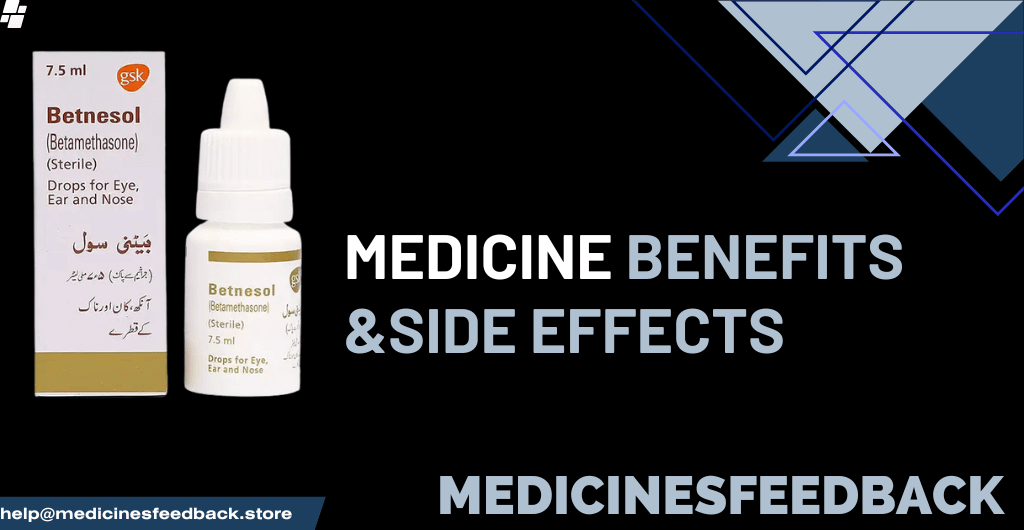Betnesol is a potent corticosteroid that is used to treat a number of illnesses, mostly because of its immunosuppressive and anti-inflammatory qualities. Skin disorders, allergies, respiratory issues, and autoimmune diseases are among the conditions for which it is frequently recommended. This post will discuss the main advantages of Betnesol, how it functions, and any possible negative effects that users should be mindful of.
How Betnesol Works

Betamethasone, a strong synthetic corticosteroid, is the active component of betnesol. The hormone cortisol, which is produced by the adrenal glands, is mimicked by corticosteroids. In the body, cortisol is essential for controlling immunological responses and inflammation. Betnesol functions by lessening the body’s inflammatory reaction to a variety of stressors, including autoimmune reactions, infections, and allergies.
The mechanism of action involves:
Suppressing inflammation:
Betnesol decreases the production of inflammatory chemicals in the body, reducing swelling, redness, and itching.
Regulating the immune system:
It dampens the overactive immune response in conditions like autoimmune diseases, where the body mistakenly attacks its own tissues.
Alleviating allergic reactions:
Betnesol helps prevent and reduce allergic reactions by limiting the immune system’s hypersensitivity to allergens.
Key Benefits of Betnesol
Betnesol’s adaptable effect provides substantial alleviation for a range of situations. Among the main advantages are
- Effective Anti-Inflammatory Action Betnesol is highly effective in treating inflammation associated with conditions like eczema, psoriasis, and rheumatoid arthritis. Its ability to reduce swelling and irritation makes it a common choice for managing chronic inflammatory diseases.
- Allergy Relief Betnesol is often prescribed to treat severe allergic reactions, including asthma, allergic rhinitis, and dermatitis. Its quick action helps alleviate symptoms like breathing difficulties, itching, and skin rashes.
- Treatment of Autoimmune Disorders Betnesol is used in the management of autoimmune conditions such as lupus, Crohn’s disease, and ulcerative colitis. By suppressing the overactive immune system, Betnesol helps prevent damage to healthy tissues.
- Relief for Respiratory Conditions In cases of severe asthma or chronic obstructive pulmonary disease (COPD), Betnesol can be prescribed to reduce airway inflammation and make breathing easier. It is also used in conditions such as croup and bronchitis.
- Topical and Oral Use Betnesol is available in different forms, including creams, drops, and tablets. This allows for flexibility in treatment depending on the condition. For example, Betnesol cream is applied topically for skin conditions, while tablets may be used for more systemic issues like asthma or autoimmune disorders.
Potential Side Effects of Betnesol
While Betnesol is highly effective, it is essential to be aware of its potential side effects, especially with long-term or high-dose usage. Some of the common and rare side effects include:
- Common Side Effects
- Skin thinning and bruising (when applied topically): Long-term usage of Betnesol cream may weaken the skin, increasing its vulnerability to ripping or bruises.
- Increased appetite and weight gain: Similar to other corticosteroids, betnesol might cause an increase in appetite, which could contribute to weight gain.
- Mood changes: Some users may experience mood swings, anxiety, or irritability while taking Betnesol.
- Increased blood sugar: Betnesol may raise blood sugar levels in diabetics or individuals who are prone to elevated blood sugar levels.
- Serious Side Effects
- Suppression of the immune system: The immune system may be weakened by prolonged usage of Betnesol, leaving the body more vulnerable to infections.
- Adrenal suppression: Corticosteroids can cause the adrenal glands to produce less natural cortisol, a condition known as adrenal insufficiency, which can result in weakness, lightheadedness, and exhaustion.
- Osteoporosis: Prolonged use of Betnesol may lead to bone thinning, increasing the risk of fractures.
- Cushing’s syndrome: Prolonged exposure to high levels of corticosteroids causes this illness, which manifests as skin changes, elevated blood pressure, and weight gain, particularly in the face and abdomen..
- Vision problems: Long-term use of corticosteroids like Betnesol may increase the risk of cataracts or glaucoma.
- Allergic Reactions Although rare, some individuals may experience an allergic reaction to Betnesol, which may manifest as a rash, itching, swelling, severe dizziness, or trouble breathing. Immediate medical attention is required in such cases.
- Tips for Safe Usage
- To minimize the risk of side effects, it’s crucial to follow your healthcare provider’s instructions when using Betnesol. Here are a few safety tips:
- Use the prescribed dose: Avoid using more than the recommended dose, as this increases the risk of side effects.
- Limit long-term use: Your doctor will probably keep an eye on your progress if you are prescribed Betnesol for a long time. If necessary, they may taper the dosage to lower the danger of adrenal suppression.
- Avoid sudden discontinuation: Withdrawal symptoms may occur if you stop using Betnesol suddenly, particularly if you’ve been taking it for a long time. When stopping use, always do as your doctor instructs.
- Monitor for side effects: If you notice any unusual symptoms, such as persistent headaches, weight gain, or mood changes, consult your healthcare provider promptly.



